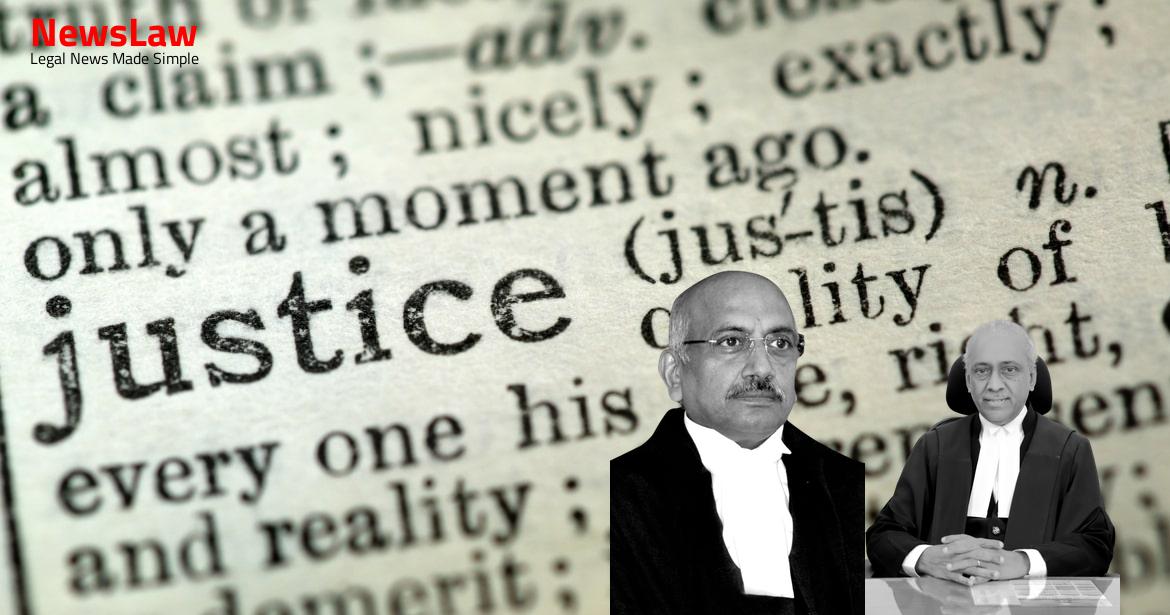This blog delves into the significant legal analysis conducted by the courts regarding the interpretation of reservation laws in the recruitment process. It discusses the crucial importance of merit-based selection in filling open quota seats before considering reserved vacancies. The court’s detailed analysis sheds light on the proper procedure for filling backlog vacancies and maintaining the statutory limit on reservations. Stay tuned to learn more about the complexities of reservation laws in the recruitment process!
Facts
- Notification issued on 12.06.2019 by Teachers’ Recruitment Board for post of Post Graduate Assistants in Chemistry.
- Total of 356 posts notified for Chemistry, with 117 vacancies for Most Backward Class (MBC) and 2 for Denotified Community (DNC) candidates.
- Break-up of 117 vacancies: 74 backlog vacancies and 43 current vacancies for MBC candidates.
- Dispute arose due to filling of vacancies for Chemistry post.
- Meritorious candidates under MBC quota were not considered under general vacancies but appointed in MBC/DNC quota against backlog vacancies.
- Provisional selection list published on 20.11.2019, names of respondents were absent.
- Respondents were not appointed due to issues in the selection process.
- The controversy revolves around the interpretation of Section 27(f) of the Tamil Nadu Government Servants (Conditions of Service) Act, 2016.
- Section 27(f) deals with the reservation for appointments, specifically in cases where qualified candidates from reserved categories are not available for selection.
- The section outlines that if qualified candidates from Backward Classes, Backward Class Muslims, and Denotified Communities are not available, the turns allotted to them shall lapse, and the selection for vacancies will be made by the next turn in the order of rotation.
- There is a ban on dereservation of vacancies reserved for Scheduled Castes, Scheduled Tribes, Most Backward Classes, and Denotified Communities during direct recruitment.
- Vacancies for the current year and backlog vacancies are announced separately for direct recruitment, ensuring that both are treated as distinct groups.
- If sufficient candidates from reserved categories are not available in the first attempt of direct recruitment, a second attempt is mandated before treating the unfilled vacancies as ‘backlog’ vacancies for the next recruitment year.
Also Read: Supreme Court Judgment on Single Till Mechanism for HRAB Calculation: A Comprehensive Analysis
Arguments
- The expression ‘first’ in Section 27(f) of the Act must be given its natural meaning as intended by the legislature.
- The selection based on merit applies before the mode of reservation post-stage.
- Legislature is presumed not to have made a mistake when the language of the statute is clear and unambiguous.
- Judicial precedents like Hardeep Singh Vs. State of Punjab & Ors. and Anil Kumar Gupta & Ors. vs State of U.P. & Ors. support the interpretation to fill open quota seats based on merit first.
- Backlog vacancies should be filled first based on merit, followed by social reservation quotas. If there is a shortfall, candidates may be adjusted accordingly.
- Reservation does not decrease below the statutory limit, even for open category candidates benefiting from reservation.
- Vested rights are limited to 69% reservation, excessive interpretation could lead to over-reservation.
- Reservation vacancies must be filled in separate classes, not counted against vacancies of the year being filled in to maintain the set limit.
- Differentiation between vertical and horizontal reservation methods is crucial, with horizontal reservation candidates not counted against vertical quotas.
- Courts avoid interpretations that render legislative words redundant, presuming deliberate and conscious word usage by the legislature.
- Proper procedure for special reservations like Scheduled Caste women involves filling regular Scheduled Caste quota first, followed by specific group allocation.
- Candidates selected on merit under open quota should not be adjusted against reserved vacancy
- Inter se seniority should be based on merit and not on the basis of roster points
Analysis
- Article 16(4B) of the Constitution of India allows the State to consider unfilled vacancies reserved for a particular year to be filled in subsequent years.
- The vacancies reserved for a specific class under clause (4) or (4A) can be carried forward and filled in the following year or years.
- Such vacancies are treated as a separate class of vacancies to be filled in the future.
- This provision ensures that reserved vacancies are not lost due to non-fulfillment in a particular year.
- Section 27 of the Act deals with reservation for appointment.
- The judgment discusses the filling of backlog vacancies first before current vacancies in recruitment processes.
- It mentions the importance of selecting meritorious candidates on open quota vacancies irrespective of caste or category.
- The principle of adjusting reserved category candidates who secure merit against general category seats is highlighted.
- The judgment emphasizes the separate announcement and accommodation of backlog vacancies before current vacancies for specific communities.
- It clarifies that Section 27 of the Act does not come into play until after the merit-based selection process.
- The judgment also notes that the issue of seniority in filling backlog vacancies was not raised in lower courts and was brought up for the first time before the higher court.
- It acknowledges the uniqueness of the situation regarding specific subject-related problems in the current year’s recruitment process.
- The State Government has relied upon the observations made by the Division Bench of the High Court of Judicature at Allahabad in the Order dated 20.02.2019 in the case of Pramod Kumar Singh v. State of U.P.
- These observations are considered relevant and are being referenced in the present case.
- The general merit list should be filled first
- The backlog vacancies of the particular reserved category should be filled next
- The remaining reserved vacancies for the current year should be filled thereafter
- The performance and merit of candidates in the list show successful candidates attaining appointment on a merit position without availing reservation
- The increase in MBC/DNC candidates does not impact the reservation of seats for other categories
- It implies that candidates from different reserved categories may not be entitled to fill MBC/DNC reserved seats if vacant
- The appeals are dismissed and parties have to bear their own costs
- The latest judgment in Saurav Yadav & Ors. case refers to steps to fill vacancies
Also Read: Selection and Appointment of Judicial Officers in Himachal Pradesh
Case Title: THE STATE OF TAMIL NADU Vs. K. SHOBANA ETC. ETC. (2021 INSC 154)
Case Number: C.A. No.-003745-003754 / 2020



